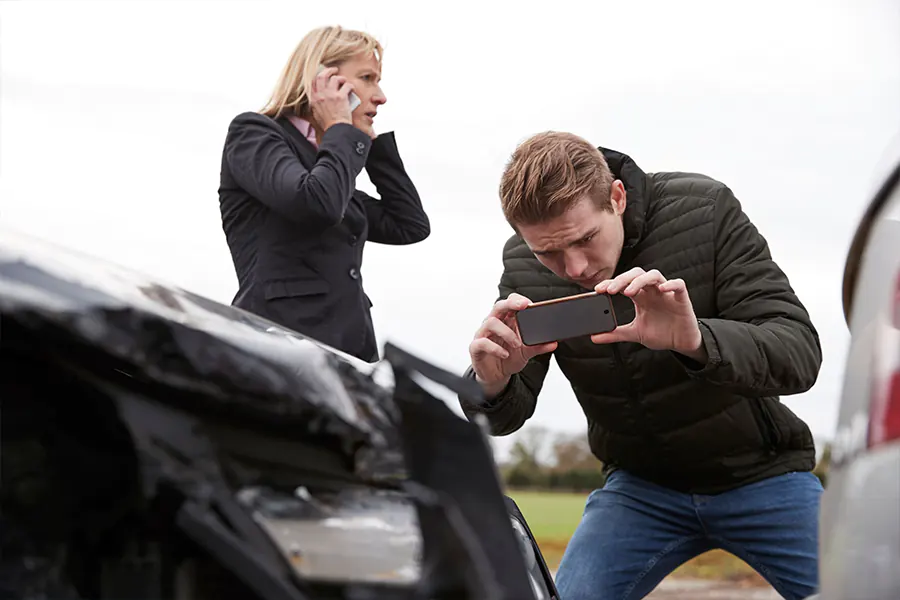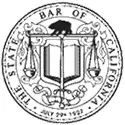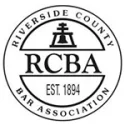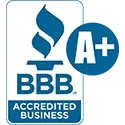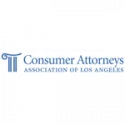If you’ve been injured in a car crash, it’s important to know your rights and what laws apply. You may be entitled to compensation, but when making your claim, you could face parties that try to deny their liability or minimize your compensation. Here are important California rules to know when claiming damages in a car accident. If you have any questions about your California car accident injury case, don’t hesitate to speak with an attorney at Zucker Personal Injury & Accident Lawyers, APC.
What happens after a car accident that is not your fault?
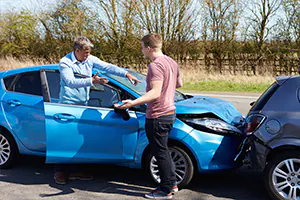
The at-fault party is liable to pay.
California is an “at-fault state” or “fault-based state” in terms of auto insurance. This means that the party who caused the accident is liable to pay for the injuries and property damage they caused. If you were the one injured, you may file a claim against the at-fault party’s insurance company.
Seek immediate medical attention.
Call 911 and have your injuries examined by a medical professional, even if you think those injuries are minor. Many car crash injuries look harmless on the surface but turn out to be more serious conditions later on. Immediate medical attention can be crucial to your health, and can support your compensation claim.
Report the accident to authorities.
California law requires motorists to report any car accident that involves injury, death, or property damage greater than $1,000. There are two authorities to report to. One, you must report within 24 hours to law enforcement, which can either be local police, the sheriff’s office, or California Highway Patrol (CHP). Two, you must report within 10 days to the Department of Motor Vehicles (DMV).
Start documenting the scene immediately.
It’s valuable to gather evidence immediately after the accident. While waiting for responders at the scene, document any relevant details about the crash. Take photos and videos of your injuries, the damage on your car, and any hazards around. Also talk to potential witnesses and ask for their names and contact details.
When the police or highway patrol arrives, they will make an accident report. Request a copy of this report as this could serve as helpful evidence in your compensation claim.
Protect yourself before dealing with insurers.
You’ll also want to contact a personal injury attorney as soon as you can. An insurance adjuster will likely call you soon after the accident, and they’ll try to get recorded statements from you that they could use against your claim. Likewise, you may need to notify your own insurance company, regardless of who was at fault in the accident. You’ll also want to practice caution when making statements to your insurer. Get the guidance of a lawyer before you speak with any insurance company.
What if the at-fault party has no insurance or inadequate insurance?
California requires drivers to carry a minimum liability insurance of $15,000 per person injured. Injury costs can easily exceed this. If the person responsible for your injuries does not have adequate insurance – or does not have insurance at all – you’ll have to consider other options to get your injuries covered. Examples are your own uninsured/underinsured motorist (UM/UIM) coverage, personal injury protection (PIP) coverage, or Med Pay.
However, these are optional coverages in California. If you haven’t purchased these coverages, talk to your attorney about other legal remedies to recover your losses. If your injuries were substantial, you may consider filing a lawsuit. Ask your accident lawyer about the best legal recourse in your case.
How is fault determined in a car accident in California?

The insurance companies of the parties involved will conduct their respective investigations as to who caused the car accident. For your personal injury compensation claim, you’ll want to work with a competent attorney who can establish the other party’s fault.
There are two ways to show that a driver is at fault in a car collision. One, you and your lawyer may show that the driver was negligent on the road. In legal terms, negligence has four elements that you must prove:
- The person had the duty to operate the vehicle with reasonable care.
- The person breached this duty.
- The person’s breach of duty caused the accident.
- The accident directly caused your losses and damages.
The other method to establish fault is by showing that the at-fault driver violated a statute or rule. Some common examples are speeding, running a red light, driving while intoxicated. A motorist who violated such rules leading up to the crash can be considered negligent per se.
What if I was partially at fault in the crash?
California adheres to the legal doctrine of “pure comparative negligence.” Under this doctrine, multiple parties may share the fault in a car accident if they contributed to it. For example, one driver may have run a red light while the other driver wasn’t paying attention to the road. Each of them may have a percentage of the fault in the collision.
This further means that even injured motorists could also be found partly at fault. If you were partially responsible in your car crash, your compensation could be reduced by your percentage of fault. For instance, if the court finds that you were 10 percent at fault, your compensation could be reduced by 10 percent. This applies even if your share of fault was 99 percent.
Insurance companies can use the comparative negligence rule to minimize the settlement they have to pay. For this reason, never admit fault or even say “I’m sorry” when speaking to an insurance adjuster. Avoid costly mistakes by getting the protection of a trusted attorney.
How does car accident compensation work in California?

Injured individuals often ask us “How do I claim my compensation?” or “What is the process for claiming injury compensation?” Here are the basic steps in the claims process for a car accident injury:
- Get a lawyer. A personal injury attorney can help assess the value of your claim, investigate the accident, and establish the other party’s fault. They can also represent you when dealing with an insurance company.
- Send a demand letter. You and your lawyer can send a formal demand letter to the other party’s insurance company, stating the facts of the case and the amount you demand as compensation. This letter initiates the insurance settlement negotiation.
- Negotiate for a fair settlement. The other party’s insurer will provide their counter-offer. Your attorney should help you determine whether this is a fair and acceptable offer, though that is rarely the case early on in the process. Your lawyer should advocate for you to get the settlement you deserve.
- File a lawsuit. Not all injury claims require filing a lawsuit, but many claimants find that insurance companies take them more seriously if they sue. Further, filing suit can be an option if insurance negotiations break down or if the insurer is not acting in good faith.
Note that a vast majority of lawsuits don’t reach a courtroom trial, but are instead settled among the parties out of court.
In less complicated cases, you may be able to get a settlement within a few months of starting negotiations. However, if the other party has reason to strongly dispute their liability, or if the case proceeds to trial, the process can stretch to a year or more.
Bear in mind that there is a deadline for filing a personal injury lawsuit. Under California’s Statute of Limitations, you generally have two years from the accident date to file your lawsuit. Missing this deadline means waiving your right to sue. Two years may seem like ample time, but many claimants have waited too long and missed their chance due to delays in the insurance claims process.
What is the average settlement for a car accident in California?
There is no accurate “average” settlement in car accident cases because settlement amounts vary widely. Each case has its own unique share of factors that affect how much the claimant receives.
Some estimates say that US car accident claims generally settle between $14,000 and $28,000, but this should not be indicative of how much your specific case is worth. At Zucker Personal Injury & Accident Lawyers, APC, we have won automobile accident cases at six and seven figures, but other cases settled for significantly different amounts.
Call a Temecula Car Accident Lawyer Today
To help you with your injury compensation claim in the Temecula area, call Zucker Personal Injury & Accident Lawyers, APC. Our personal injury attorneys are highly trusted in the valley for our excellent track record in obtaining favorable settlements for our clients. Consult with us for free. Call (951) 699-2100 today or send us a message through our online form.

